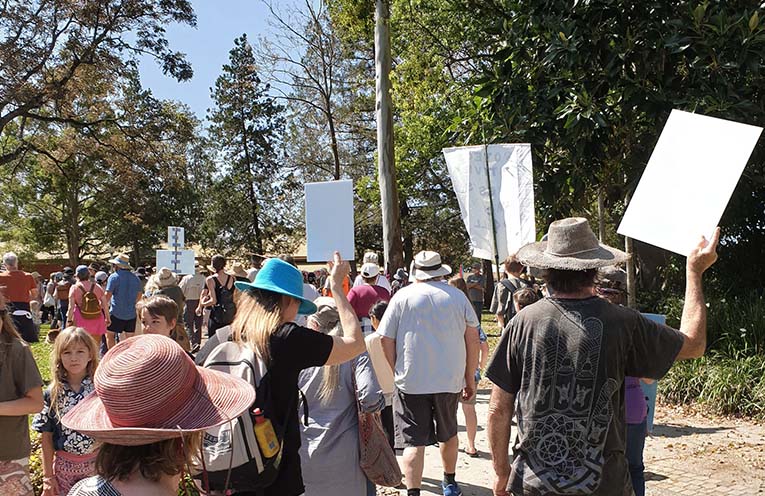
ACTION to protest logging in native forests continues on the Coffs Coast, with a march in Bellingen last Saturday, September 17, to protest proposed logging of what activists say is over 1,500 hectares of prime native animal habitat near the Kalang headwaters.
Activists say the forest is Greater Glider/Koala/Glossy Black Cockatoo/Giant Barred Frog/ Wompoo Pigeon/Rufous Scrub Bird habitat, and will continue to protest until logging in native forests ends.
 Advertise with News of The Area today.
Advertise with News of The Area today.It’s worth it for your business.
Message us.
Phone us – (02) 4981 8882.
Email us – media@newsofthearea.com.au
The march comes on the back of the NSW Government being accused of ignoring an Upper House report into the timber industry and a petition signed by 21,000 people.
The petition called for an end logging in native forests and the report, titled ‘Long term sustainability and future of the timber and forest products industry’, called for the NSW Government to conduct a cost benefit assessment of the native hardwood forestry sector and for increased investment to expand softwood and hardwood plantations in NSW.
The report was also highly critical of the NSW Government for failing to publicly release and respond to a Natural Resources Commission (NRC) report into post fire logging in NSW, which found badly burnt native forests in NSW were at risk of “serious and irreversible” harm from the combined impacts of the 2019/20 fires and ongoing logging.
NSW Greens Legislative Council Member, Sue Higginson, said the response from the Minister for Agriculture Dugald Saunders to petitioners relies on questionable facts and disregards the legitimate social and scientific concerns about the future of the industry and all of the workers and communities that currently rely on it.
“The Government response to this petition has completely failed to address the looming and unavoidable end of public native forestry in NSW,” said Ms Higginson.
“The claims made by the Minister about the sustainability and lifespan for native forest logging are misleading and run completely contrary to community experience and independent science.”
Mr Saunders’ response, sent to each petitioner, outlined in some detail the Government’s position that ‘sustainable’ logging of native forests will continue.
He wrote that Forestry Corporation of NSW (FCNSW) operates under legal frameworks that ‘contain clear
requirements, protocols and guidelines to protect native plants, animals, important habitat and ecosystems, soils and water, and requirements to achieve ecologically sustainable forest management (ESFM).
This includes protections to manage koalas and their habitat including harvest ‘exclusion zones and the retention of koala feed trees’.
Other reasons for continuing to log native forests given by the Minister included the length of time needed to grow hardwood plantations and the better quality of timber from native forests.
Ten major conservation groups, including the North East Forest Alliance (NEFA) and North Coast Environment Council have also expressed their dismay at the Minister’s response.
NEFA spokesperson Dailan Pugh said, “The NSW Government’s callous disregard for our threatened species is why Koalas, and hollow-dependent species such as Greater Gliders, Yellow-bellied Gliders, Gang Gang Cockatoos and Glossy Black Cockatoos are becoming increasingly endangered.”
The CEO of the Nature Conservation Council, NSW’s peak conservation body, Jacqui Mumford said, “We fully support the committee’s recommendation to expand timber plantations wherever this can be done without losing native forests or highly productive farmland.
“The need to protect native forests from industrial logging has never been greater, with koalas and many other forest species sliding towards extinction, and huge areas of forest decimated by the 2019-20 bushfires,” she said.
Ms Higginson said, “The likely cost of the native hardwood industry is much higher as the destruction of native forests has a significant effect on downstream water quality and the agricultural and fisheries industries
“Although only one percent of state forests are logged each year, this adds up to 30 percent of the public native forest estate being logged on a recurring basis that permanently degrades the ecology and sustainability of these environments.”
Ms. Higginson said that around 1000 people are directly employed by the native forest logging industry in NSW and the petition is calling for a transition plan that allows for these people to remain in work while the industry transitions to a truly sustainable model.
She noted that the Western Australian and Victorian governments have both taken steps to ensure that workers and communities are taken care of as the industry is phased out.
Independent Legislative Council Member, Justin Field, a member of the committee that compiled the report, said, “My strong sense, having heard the evidence before the committee and watching this industry over many years, is that these forests are worth much more standing, either as ecological and recreational reserves or for their carbon storage value”.
Mr. Field said “There will be ongoing jobs in the timber industry and in forest management but it needs a plan to be sustainable in the future”.
“Just relying on logging the guts out of our native forests is no plan at all”, he said.
By Andrew VIVIAN
